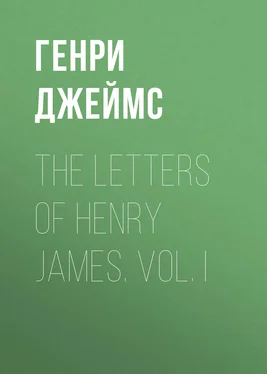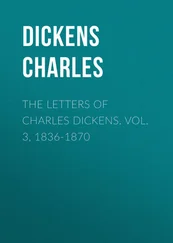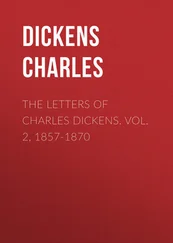Генри Джеймс - The Letters of Henry James. Vol. I
Здесь есть возможность читать онлайн «Генри Джеймс - The Letters of Henry James. Vol. I» — ознакомительный отрывок электронной книги совершенно бесплатно, а после прочтения отрывка купить полную версию. В некоторых случаях можно слушать аудио, скачать через торрент в формате fb2 и присутствует краткое содержание. Жанр: Биографии и Мемуары, foreign_antique, foreign_prose, на английском языке. Описание произведения, (предисловие) а так же отзывы посетителей доступны на портале библиотеки ЛибКат.
- Название:The Letters of Henry James. Vol. I
- Автор:
- Жанр:
- Год:неизвестен
- ISBN:нет данных
- Рейтинг книги:4 / 5. Голосов: 1
-
Избранное:Добавить в избранное
- Отзывы:
-
Ваша оценка:
- 80
- 1
- 2
- 3
- 4
- 5
The Letters of Henry James. Vol. I: краткое содержание, описание и аннотация
Предлагаем к чтению аннотацию, описание, краткое содержание или предисловие (зависит от того, что написал сам автор книги «The Letters of Henry James. Vol. I»). Если вы не нашли необходимую информацию о книге — напишите в комментариях, мы постараемся отыскать её.
The Letters of Henry James. Vol. I — читать онлайн ознакомительный отрывок
Ниже представлен текст книги, разбитый по страницам. Система сохранения места последней прочитанной страницы, позволяет с удобством читать онлайн бесплатно книгу «The Letters of Henry James. Vol. I», без необходимости каждый раз заново искать на чём Вы остановились. Поставьте закладку, и сможете в любой момент перейти на страницу, на которой закончили чтение.
Интервал:
Закладка:
To W. D. Howells
My dear Howells,
Your letter of Jan. 19th and its enclosure (your review of my Hawthorne ) came to me last night, and I must thank you without delay for each of them....
Your review of my book is very handsome and friendly and commands my liveliest gratitude. Of course your graceful strictures seem to yourself more valid than they do to me. The little book was a tolerably deliberate and meditated performance, and I should be prepared to do battle for most of the convictions expressed. It is quite true I use the word provincial too many times—I hated myself for't, even while I did it (just as I overdo the epithet "dusky.") But I don't at all agree f with you in thinking that "if it is not provincial for an Englishman to be English, a Frenchman French, etc., so it is not provincial for an American to be American." So it is not provincial for a Russian, an Australian, a Portuguese, a Dane, a Laplander, to savour of their respective countries: that would be where the argument would land you. I think it is extremely provincial for a Russian to be very Russian, a Portuguese very Portuguese; for the simple reason that certain national types are essentially and intrinsically provincial. I sympathize even less with your protest against the idea that it takes an old civilization to set a novelist in motion—a proposition that seems to me so true as to be a truism. It is on manners, customs, usages, habits, forms, upon all these things matured and established, that a novelist lives—they are the very stuff his work is made of; and in saying that in the absence of those "dreary and worn-out paraphernalia" which I enumerate as being wanting in American society, "we have simply the whole of human life left," you beg (to my sense) the question. I should say we had just so much less of it as these same "paraphernalia" represent, and I think they represent an enormous quantity of it. I shall feel refuted only when we have produced (setting the present high company—yourself and me—for obvious reasons apart) a gentleman who strikes me as a novelist—as belonging to the company of Balzac and Thackeray. Of course, in the absence of this godsend, it is but a harmless amusement that we should reason about it, and maintain that if right were right he should already be here. I will freely admit that such a genius will get on only by agreeing with your view of the case—to do something great he must feel as you feel about it. But then I doubt whether such a genius—a man of the faculty of Balzac and Thackeray— could agree with you! When he does I will lie flat on my stomach and do him homage—in the very centre of the contributor's club, or on the threshold of the magazine, or in any public place you may appoint!—But I didn't mean to wrangle with you—I meant only to thank you and to express my sense of how happily you turn those things.—I am greatly amused at your picture of the contributing blood-hounds whom you are holding in check. I wish immensely that you would let them fly at me—though there is no reason, certainly, that the decent public should be bespattered, periodically, with my gore. However my tender (or rather my very tough) flesh is prescient already of the Higginsonian fangs. Happy man, to be going, like that, to see your plays acted. It is a sensation I am dying (though not as yet trying) to cultivate. What a tremendous quantity of work you must get through in these years! I am impatient for the next Atlantic . What is your Cornhill novel about? I am to precede it with a poorish story in three numbers—a tale purely American, the writing of which made me feel acutely the want of the "paraphernalia." I must add, however (to return for a moment to this), that I applaud and esteem you highly for not feeling it; i.e. the want. You are certainly right—magnificently and heroically right—to do so, and on the day you make your readers—I mean the readers who know and appreciate the paraphernalia—do the same, you will be the American Balzac. That's a great mission—go in for it! Wherever you go, receive, and distribute among your wife and children, the blessing of yours ever,
H. JAMES jr.To Charles Eliot Norton
My dear Charles,
I wish you could take a good holiday and spend it in these countries. I have got to feel like such an old European that I could almost pretend to help to do you the honours. I am at least now a thoroughly naturalised Londoner—a cockney "convaincu." I am attached to London in spite of the long list of reasons why I should not be; I think it on the whole the best point of view in the world. There are times when the fog, the smoke, the universal uncleanness, the combined unwieldiness and flatness of much of the social life—these and many other matters—overwhelm the spirit and fill it with a yearning for other climes; but nevertheless one reverts, one sticks, one abides, one even cherishes! Considering that I lose all patience with the English about fifteen times a day, and vow that I renounce them for ever, I get on with them beautifully and love them well. Our dear Vasari, I fear, couldn't have made much of them, and they would have been improved by a slight infusion of the Florentine spirit; but for all that they are, for me, the great race—even at this hour of their possible decline. Taking them altogether they are more complete than other folk, more largely nourished, deeper, denser, stronger. I think it takes more to make an Englishman, on the whole, than to make anyone else—and I say this with a consciousness of all that often seems to me to have been left out of their composition. But the question is interminable, and idle into the bargain. I am passing a quiet autumn. London has not yet waked up from the stagnation that belongs to this period. The only incident of consequence that has lately occurred to me was my dining a few days since at the Guildhall, at the big scrambling banquet which the Lord Mayor gives on the 9th November to the Cabinet, foreign ministers, etc. It was uncomfortable but amusing—you have probably done it yourself. I met Lowell there, whom I see, besides, with tolerable frequency. He is just back from a visit to Scotland which he appears to have enjoyed, including a speech-making at Edinburgh. He gets on here, I think, very smoothly and happily; for though he is critical in the gross, he is not in the detail, and takes things with a sort of boyish simplicity. He is universally liked and appreciated, his talk enjoyed (as well it may be, after some of their own!) and his poor long-suffering wife is doing very well. I therefore hope he will be left undisturbed by Garfield to enjoy the fruition of the long period of discomfort he has passed through. It will be in the highest degree indecent to remove him; though I wish he had a pair of secretaries that ministered a little more to the idea of American brilliancy. Lowell has to do that quite by himself....
Believe me always faithfully yours,
H. JAMES jr.To his Mother
Dearest mammy,
This is a pleasant Sunday, and I have been spending it (from yesterday evening) in a very pleasant place. 'Pleasant' is indeed rather an odd term to apply to this gorgeous residence, and the manner of life which prevails in it; but it is that as well as other things beside. Lady Rosebery (it is her enviable dwelling) asked me down here a week ago, and I stop till tomorrow a.m. There are several people here, but no one very important, save John Bright and Lord Northbrook, the last Liberal Viceroy of India. Millais, the painter, has been here for a part of the day, and I took a walk [with him] this afternoon back from the stables, where we had been to see three winners of the Derby trotted out in succession. This will give you an idea of the scale of Mentmore, where everything is magnificent. The house is a huge modern palace, filled with wonderful objects accumulated by the late Sir Meyer de Rothschild, Lady R.'s father. All of them are precious and many are exquisite, and their general Rothschild-ish splendour is only equalled by their profusion....
Читать дальшеИнтервал:
Закладка:
Похожие книги на «The Letters of Henry James. Vol. I»
Представляем Вашему вниманию похожие книги на «The Letters of Henry James. Vol. I» списком для выбора. Мы отобрали схожую по названию и смыслу литературу в надежде предоставить читателям больше вариантов отыскать новые, интересные, ещё непрочитанные произведения.
Обсуждение, отзывы о книге «The Letters of Henry James. Vol. I» и просто собственные мнения читателей. Оставьте ваши комментарии, напишите, что Вы думаете о произведении, его смысле или главных героях. Укажите что конкретно понравилось, а что нет, и почему Вы так считаете.












